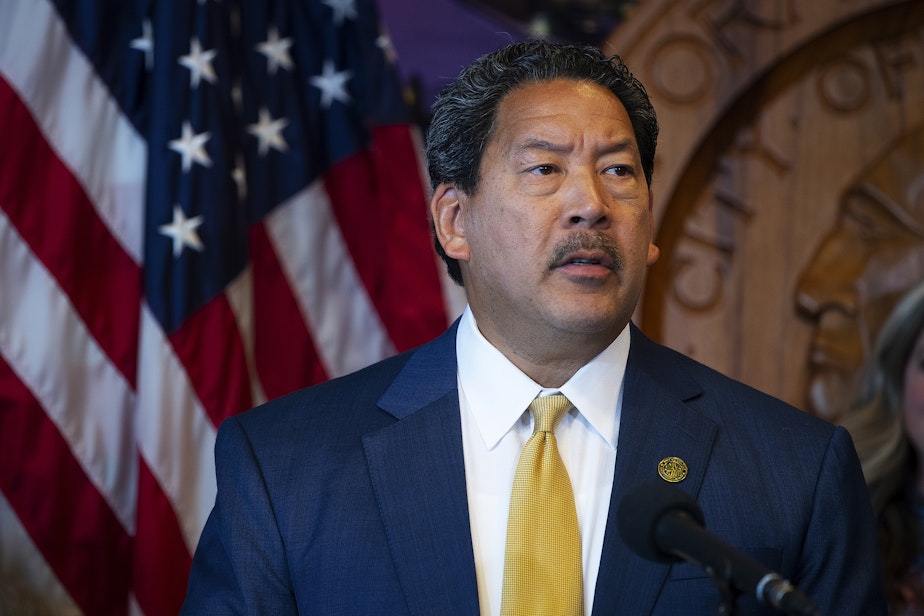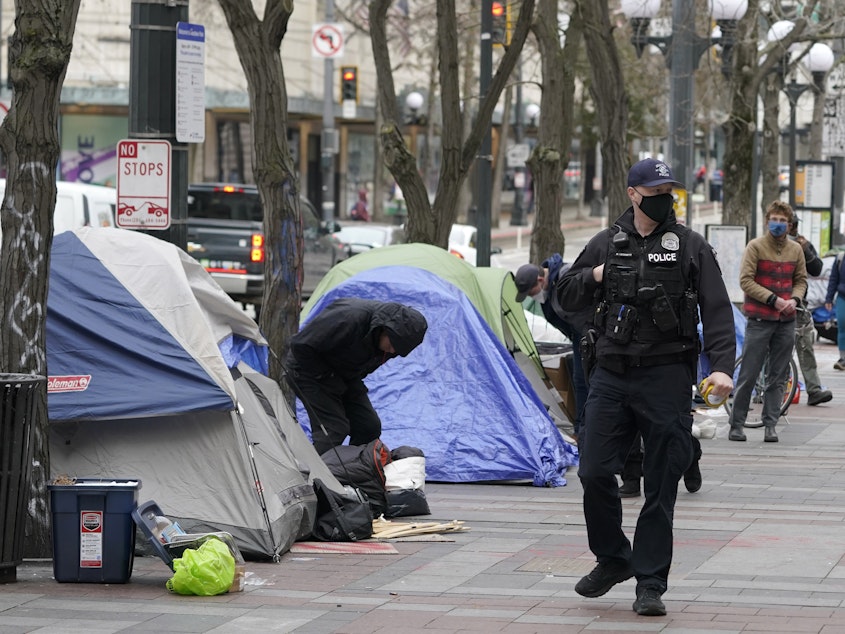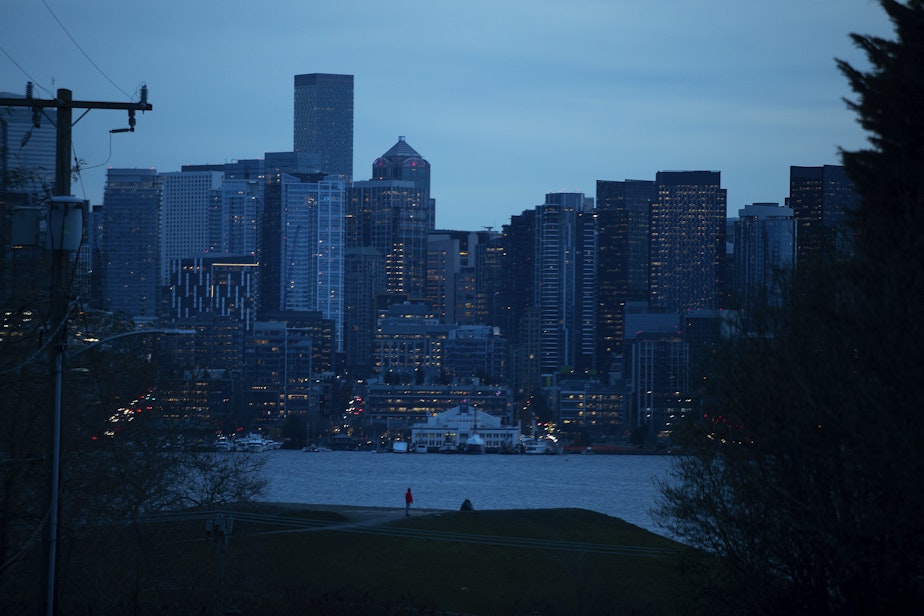Mayor Harrell promises more police accountability, balanced approach to Seattle growth

Seattle Mayor Bruce Harrell this week defended his record on housing, balancing the budget, and public safety, and promised that 2025 will bring more accountability to the Seattle Police and more business downtown.
In a wide-ranging interview heading into an election year when he will try to become the first two-term mayor since Greg Nickels, Harrell told KUOW he is excited about Seattle’s incoming police chief, the expansion of the city’s mental health crisis response team, and implementing new housing strategies.
“We think we’ve laid a great foundation to move on,” he said. “We want Seattle to be the thriving Emerald City.”
Ongoing police concerns
Harrell said he believed the arrival of Seattle Police Chief nominee Shon Barnes in the coming weeks would help shift the department’s culture, which has been criticized, especially by female officers, as a “good old boys club.”
Sponsored
Adrian Diaz, the previous chief chosen by Harrell, was fired in December over claims that Diaz had an affair with a former staffer who he’d hired for a position that paid almost $200,000 a year.
During his tenure, eight officers brought lawsuits against SPD over accusations of racism, sexism, and discrimination, with four of the five lawsuits specifically naming Diaz. One female officer accused him of “predatory behavior.”
RELATED: 'Beauty and the chief.' How a secret romance ended former Seattle Police Chief Diaz's career
Harrell said he inherited some of the cultural problems in the police department, but he believed things were moving in the right direction. He cited Barnes’ record as chief of the Madison Police Department, where 28% of officers are women.
“That was very intentional,” Harrell said. “Once you meet him — and I hope you and the city will meet him very shortly, in a matter of weeks — you’ll see that he's very empathetic. He tracks well. He's an outstanding listener, outstanding speaker. And it starts with that kind of leadership.”
Sponsored
The Seattle Police Department has been under a federal consent decree since 2012 as part of a settlement between the city and the U.S. Department of Justice related to concerns over the use of excessive force and patterns of biased policing.
In a hearing last year, U.S. District Judge James Robart praised improved practices at SPD but raised questions about the lack of progress with accountability provisions in the city’s 2021-23 contract with the police union.
The city and the Seattle Police Officers Guild are now in negotiations for their latest contract, which will likely bring a renewed focus on the accountability provisions when a tentative agreement is reached.
RELATED: SPD's on track for release from federal oversight despite flawed police contract, judge says
Harrell said accountability is key, but that comes from the top down as well as from the bottom up.
Sponsored
“With respect to accountability, there are two things occurring. No. 1 is the attitudinal or cultural change that Chief Barnes and I and members of my team are trying to impress upon this department,” he said. “Then No. 2, we need to look at the [Office of Police Accountability] director, the Ombuds office, the Office of the Inspector General, And how complaints, for example, are filed within the police department, and really stand back, look at it globally. Understand we had a problem with unreasonable force that once was in alarming numbers. We've really got our arms around that. So moving forward, what can a better system look like?"
Homelessness and housing

One of Seattle’s most pressing issues is housing — a lack of affordable housing, skyrocketing home prices, and widespread homelessness. In 2023, Seattle voters passed a $970 million housing levy to alleviate some of those problems.
Harrell said that levy, his proposed 2025-26 budget, and Seattle’s proposed comprehensive plan are all focused on housing. The proposed comprehensive plan, for example, would double zoning capacity in Seattle and focus development on urban villages and newly designated “neighborhood centers.”
Sponsored
Harrell said balancing growth while maintaining a livable city is a long game that he and city leaders are playing as best they can.
“We're living in a city that is experiencing growth, and many of these people are coming in the tech sector, and a lot of them have more affluence than others,” he said. “But I'm also trying to build a city for the barista and the health-care worker and the teacher, so we have to have more housing. And when we're talking about doubling the capacity, that's what we're trying to do. I would also suggest that, even within your lifetime and mine, the zoning that we are preparing for likely won't be built.”
During Harrell’s administration, the city has increased sweeps of homeless encampments, especially downtown. But King County has reached near capacity in its homeless shelters.
Some believe the people who are being displaced from downtown are just relocating to other areas, such as the Chinatown-International District. Harrell said he is committed to providing every person who is removed from an encampment with a place to stay.
“That is the law, that is the policy, and we comply with the law and comply with policies, many of which I actually authored while I was on the City Council,” he said. “We provide housing first to people, no matter what their condition is.”
Sponsored
RELATED: Homelessness continues to get worse. Should Seattle, and the U.S., still embrace 'Housing First'?
Still, Harrell admitted that more needed to be done and recounted a story of how he and his wife recently took their grandkids out to dinner, and his granddaughter cried because she saw someone sleeping on the street.
“I had to do a FaceTime call with her to assure her that Papa Bruce is doing everything possible to house that person,” he said.
RELATED: Homeless encampments are on the decline, Seattle officials say. But where do those people land?
Budget crunch
Seattle is expected to face a budget deficit of $80 million in the next two years. City Councilmember Cathy Moore recently put forward a plan for a citywide capital gains tax to fund things like rent assistance, but that did not pass. Meanwhile, Seattle has been leaning on the JumpStart payroll tax to cover general fund expenses.
Despite those fiscal pressures, Harrell was resistant to the idea of using new taxes to help balance the budget. He said when he took office, he was faced with a budget deficit of between $200 million and $250 million and he balanced that budget without adding new taxes.
RELATED: How the Seattle City Council plans to patch a budget hole with JumpStart revenue
He said that one of his main jobs is to attract new businesses to Seattle and keep the job providers Seattle already has in the city.
“These are choices that employers are making to continue here in Seattle. And so when I'm competing against other jurisdictions, whether it's Bellevue, Mercer Island, Renton, or Federal Way, I want to make sure businesses want to do business here,” Harrell said. “We're not opposed to new taxes, but we have to make sure that regionally, we are in the best position to compete.”
Downtown revitalization

One of the areas Harrell has focused on during his first term as mayor is Seattle’s downtown. The aim is to decrease crime, increase livability, and keep businesses open and thriving in the city’s core.
Harrell pointed to an overall decrease in crime and medical emergencies downtown during his first term — a 27% decrease in violent crime, a 14% drop in emergency calls, and 33% fewer medical responses.
“Now that doesn't solve the plywood problem, the problem with stores boarded up,” he said. “The other part of my job is I have to be the biggest recruiter around.”
For example, Harrell said he spent the previous Saturday night talking to a large insurance company that is considering relocating its offices downtown.
“I gave them one of the best rah-rah speeches that I’ve given,” he said.
He also said he’s been on the road talking to bio-tech and high-tech companies interested in coming to Seattle.
He said downtown Seattle would come back from its pandemic lull, but it would be new and different from the downtown he remembers because of e-commerce and other changes in the way people do business and work.
RELATED: 5 creative ideas cities use to revive their downtowns. Could they work in Seattle?
That said, Harrell remains confident about Seattle’s present and its future.
“We have a great trajectory,” he said. “We like where we're heading.”
The return of Trump
In an interview last month with KIRO Newsradio, Harrell suggested that he did not object to incoming President Trump’s vow to deport undocumented people who commit additional crimes while in the U.S.
But Harrell told KUOW he is concerned about the potential under the Trump administration of unlawful ICE raids and separating people from their families. He said he has a history of being supportive of immigrant refugee communities, and that would continue under the second Trump administration.
“The fact of the matter is I’m not sure exactly what to expect,” Harrell said. “I’m going to talk with all of our leaders and our regional players in this… and we’re going to get through this together as one Seattle family.”






